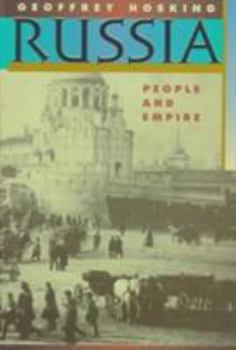Russia: People and Empire, 1552-1917
Select Format
Select Condition 
Book Overview
Explores Russian history in light of the dissolution of the Soviet empire, focusing on the building of the empire as an obstruction to the flowering of a nation, which is more important than any other factor in explaining the country's backwardness.
Format:Hardcover
Language:English
ISBN:067478118X
ISBN13:9780674781184
Release Date:May 1997
Publisher:Harvard University Press
Length:548 Pages
Weight:2.02 lbs.
Dimensions:1.8" x 6.5" x 9.6"
Customer Reviews
1 rating
Russia explained
Published by Thriftbooks.com User , 22 years ago
I had modest expectations about this book and was pleasantly surprised. This is always better and much less common than the other way around.According to Richard Pipes, there is nothing particularly new in the thesis of Hosking's book: the main problem of Russia is the delay in nation-state forming due to great tension between the people with its traditional culture and the Petrine Empire looking to the West for its inspiration and model. I suppose the idea must have occurred to some observers, myself included, but this is the first consistent attempt to follow it to its logical conclusion. Amazingly, it explains quite a lot, and many purported mysteries of the Russian history simply dissolve. The book is especially valuable because of the light it sheds on the present history: the sudden dissolution of the empire and the inability of the remainder to establish any meaningful relationship with the West. The Petrine initiative has run its course, and the country is feverishly building its identity from scratch - an odd and disturbing picture at the beginning of the 21st century when many claim the very idea of the nation-state is a thing of the past.It is a great pity that such a book did not appear at least a decade ago: it would have got a wider notice and served a better purpose. As it is, the West has lost most of its interest in its erstwhile prime adversary. As to Russia itself, even though the book was been published there in translation, I was amazed to discover that it hardly made a stir. Perhaps my amazement is misplaced: nationalist fever is not the best vantage point for an objective evaluation of the past. Besides, the decades of Marxist scholarship has made a veritable mess of the language, and the very word "nation" is simply untranslatable into modern Russian, producing much confusion.Mr. Hosking's book is very accessible and readable. My only quibble is that the thesis is a bit overexploited - a drawback I am inclined to excuse in such a pioneering effort.






